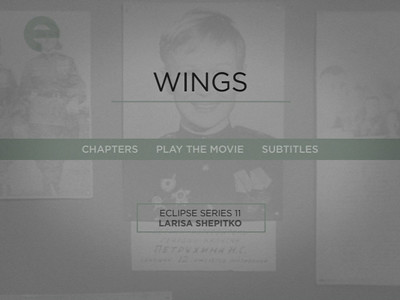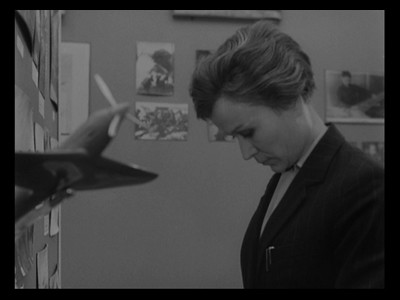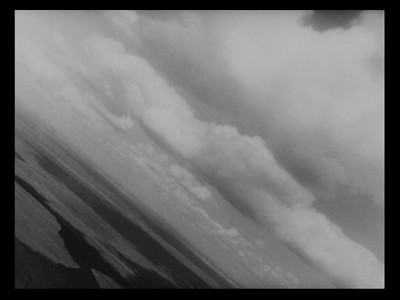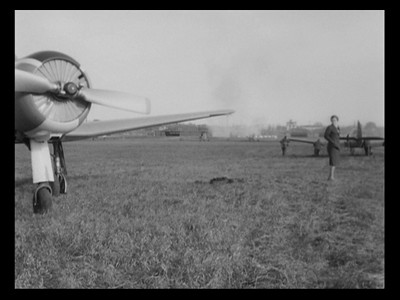
There is a scene near the end of Larisa Shepitko's first professional film, Krylya, a.k.a. Wings, where her subject, Nadezhda Petrukhina (Maya Bulgakova), is waiting to meet with her friend in the museum where he works as a director. She happens to be sitting by an exhibit celebrating Russian pilots from WWII, including the Women's Air Corps, of which she was a member. The tour guide, not realizing the actual woman is in the room, points out a photo of Nadya to a group of children, and a little girl asks whether or not she died in the war. Though this is a question whose answer Nadya knows better than anyone, it gives her pause. Looking at the larger picture of who she is now, maybe she didn't survive the war after all.
Wings is a quiet film, shot by Shepitko and cinematographer Igor Slabnevich with a keenly observant eye. Released in 1966, it's a movie of profound beauty, moving effortlessly from cramped, rundown interiors to wide open public spaces and somehow making its protagonist look small in either of them. In its first half hour, Wings seems to be about nothing, more a string of non-events than a plot-driven happening. Then, as these events gather in number, Shepitko reveals that her movie, co-written by Valentin Yezhov (Siberiade

Following an injury, Nadya's decorated service as a pilot ended, as did her romance to another pilot, Mitya (Leonid Dyachkov), who did not make it out of battle. Two decades later, Nadya now lives an ordinary life as the headmistress of a high school. It's not a satisfying occupation for her. She is unable to get through to her students, who have a different view of duty and obedience than she did at their age. Likewise, she is estranged from her own daughter, Tanya (Zhanna Bolotova), whose point of view is so far removed from her mother's, the young woman actively avoids her. It's not a generation gap that separates them so much as an intraversable canyon.
Not that Nadya is an easy person to get close to even without the age difference. She is at once exacting, insisting that her standards be met, and distracted, her mind always elsewhere, often in the skies, remembering once again what it's like to fly. She regularly visits the air field and her old friends, trying to get some kind of contact buzz from their escapades above the clouds. Nadya's dogmatic views about duty are somewhat ironic, as she is always in motion, abandoning tasks before they are finished and moving on to the next thing, or quite often, nothing at all, just moving on. This actually gives Wings a sense of momentum. Shepitko's camera is rarely settled in place. Even if Nadya isn't moving, the director is cutting to various details, dialing in closer to see a nervous twitch or how she shuffles her feet. As a woman in her 40s, Nadya is expected to be still, but she wants to be free to fly.

The nostalgic flashbacks and fantasy flights that Nadya takes are given a feeling of otherness by being framed largely as point-of-view shots. Our entire vision of Mitya, for instance, is seen through his lover's eyes. So, too, do the imaginary clouds pass like we are in the pilot's seat ourselves. In these scenes, the camera is still moving, but almost as if it has come unmoored, like it has taken flight, as well. Shepitko also uses freeze frames in the flashbacks to halt them, to remind us that they are frozen in time, before moving on again to the next memory, almost like some frames are missing from the reels of film in Nadya's mind.
Around the time of Nadya's trip to the museum, there is a subtle shift in her character. Just as the "plot" sneaks up on us, so does this transformation. You don't see glaciers move or flowers grow, they just suddenly are different than you last remembered. Maya Bulgakova spends the early part of the film hunched over. Her movements are jerky and anxious. As she begins to realize that she can be happy again, to try to bring the joys of youth back into her present, her movements get more fluid. So, too, does she go from barely speaking to becoming increasingly talkative. In one of the only real conversations she has in the film, she sits with another woman her age, Shura (Rima Nikitina-Markova), and reminisces about being young and how people thought she would be an artist. The two sing and dance in Shura's café, and Nadya actually smiles. Unfortunately, the men staring at them through the window remind her that she is still on the ground.

This is not the escape Nadezhda Petrukhina requires, either; that is saved for the final surprising and elegiac moments of Wings. It's a tremendous release for a movie that has up until then been entirely about restraint. Larisa Shepitko's portrayal of a teacher who has seen better days shares thematic shelf space with Ingmar Bergman's Wild Strawberries and Anthony Asquith's The Browning Version. Her quiet and precise directorial style, though, will remind some of her compatriot Andrei Tarkovsky, who was her classmate at film school. Yet, she has a more self-assured sense of humanity than Tarkovsky, and her point-of-view is decidedly feminine when compared to the Bergman or Asquith pictures. Her heroine is less expressive than the male teachers, less prone to monologue, and given Nadya's pilot background, more inclined toward action--usually a more male trait, to be sure, but given that Nadya didn't really choose her career, hers is again more of a feminine problem in that less options were likely available to her. Her time for reflection is over, and so she instead seizes opportunity, and rather than accept her fate, soars above it. One can't help but see this as Larisa Shepitko's own feminist statement of intent, using a woman of an older generation to shed the shackles of the past and rocket ahead into a brighter future.


3 comments:
This movie was great. I thought this had one of the best endings of any movie I've ever seen.
Up to last night, I had only two encounters with the director's work (and two meetings before she, so trajically, died. A film called "Electricity" and her last "Ascent". Wings is a masterpiece of a sort. The sort of the calm on the surface, furious underneath and always magnificent in the way it reaches its final chapter kind of film. In her approach, Larisa Shepitko reveals a lot with the least exposure possible. Look at the triple-layered opening scene. No film could start like that and go wrong afterwards.
The end of this film put me into tears; it was brilliantly transcendent. Shepitko was a genius whose career was tragically cut short. Who knows what other masterpieces she might have made? This film and "Ascent" are in my top ten of all Russian films.
Post a Comment